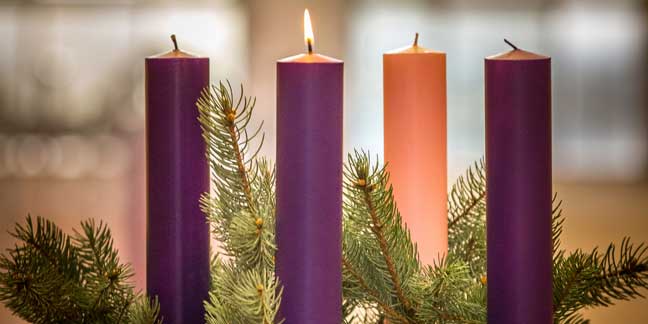The Third Sunday of Advent is also called Gaudete Sunday because of the first word of the entrance antiphon. Gaudete is Latin for “rejoice”; each reading today is an invitation to joy because it proclaims that the Lord is near and will soon be in our midst.
In today’s First Reading Zephaniah tells Israel why it should be rejoicing. The Lord is not just going to show mercy to them and save them; he is going to rejoice among them. Zephaniah speaks of a judgment withdrawn and enemies turned away: whenever Israel was unfaithful to the covenant they believed the Lord sent enemies to punish them for their transgressions. The Lord is no longer a just Judge executing judgment on them; he is now a defender and advocate in their midst. In Advent we remember that before the coming of Our Lord we were estranged from him and at the mercy of sin. He’s coming to change that. The Lord is not just in our midst grudgingly; he’s happy to be among his people and he’s rejoicing over us and as one of us.
In today’s Second Reading St. Paul reminds us that Our Lord being near is a cause for rejoicing. Just as we take comfort and security from our parents being close when we’re children, so we should also take comfort and security from knowing Our Lord is never far away. In Advent we rejoice that Our Lord, Our Savior, is close and will never be far away again. Paul encourages us to ask the Lord for whatever we need without anxiety. Our Lord is worthy of our trust and gratitude, so we trust he’ll give us what we need. That attitude fills us with the peace of God, a deeper and more lasting peace than the world can offer. What better reason to rejoice?
In today’s Gospel people are flocking to John because expectation is building that a change for the better is at hand. People from all walks of life are approaching John and asking advice on the right thing to do. They’re willing to share and willing to be fair in their dealings with others. A better society is at hand, which is why they start asking themselves whether John is the Christ. John tells them that the Christ is coming and promises something even better than what he is calling for: a salutary shake-up. Winnowing fans were used to toss grain and straw into the air: the straw and chaff would blow away, leaving the grain to fall back onto the floor. The “grain” is everyone and everything good and just, while the “chaff” is burned as bad and useless. Even if a shake-up was coming, it is for the sake of good, not evil. Even today Advent is a time for letting ourselves be shaken out of our complacency for the sake of something better. In the Second Reading today Paul said our kindness should be known to all. It is the kindness of Our Savior that should inspire us this Advent to show that kindness.
Joy is meant to be contagious. One smile can “infect” a whole room. The best way we can foster our own joy during Advent is to share it and spread it. Some people are masters of spreading “Christmas cheer.” We can be passive and simply take the cookies when they come, or we can take the initiative and organize the joy, bake the cookies, cheer up someone who is feeling down. Paul teaches us that God loves a cheerful giver (2 Corinthians 9:7), and Our Lord teaches us in Advent that it is giving that brings us cheer. He rejoices in us, so let us rejoice in him and share the joy.
Readings: Zephaniah 3:14–18a; Isaiah 12:2–6; Philippians 4:4–7; Gospel Luke 3:10–18. See also 3rd Sunday of Advent (Gaudete Sunday).



